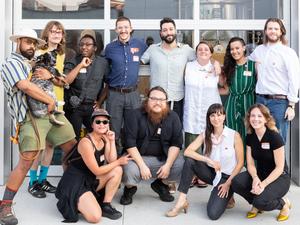
While there are treatment options for the 2 million Americans that suffer from inflammatory bowel diseases (IBD), like Crohn’s disease and ulcerative colitis, those options do not come without pitfalls.
They can be costly, often in the neighborhood of $25,000 per year, and detrimental to a patient’s immune system. They can also come with some nasty side effects, including but not limited to headaches, abdominal pain, diarrhea, nausea, vomiting and respiratory infection.
Now, a former life sciences investor turned entrepreneur thinks he has found a more effective way to treat IBD—and at a much lower cost.
John Round has founded Biotica Bio, a company using microbiome-derived elements to modulate IBD diseases. The solution will be an oral pill or powder, one that is much more affordable and less invasive than traditional treatments.
Biotica’s approach removes the live component of the human microbiome, which consists of all of the bacteria and fungi that live on and inside the human body. That eliminates the unpredictable elements that stir up unwanted side effects, create unpredictable physiological responses and dilute potency. Live microbes, or probiotics, are finicky about where they live, and a foreign gastrointestinal tract can be an inhospitable place.
“The standard of care [right now] is intravenous administration of a variety of biologics,” Round told Rhode Island Inno. “There are approved drugs and biologics that tamp down the immune system and tell the body to relax. As a result, there are fewer inflammatory events, but now the body is more susceptible to infections and has a weaker immune system. The drugs include antibodies and mesalamines.”
Round said his startup’s solution plays off the idea that the immunobiology in the gut is incredibly active and diverse, more so than previously appreciated. The oral administration of a pill or powder can interact delicately with the gut’s immune system, alleviating IBD symptoms without being intrusive.
Round’s go-to-market strategy involves getting Biotica Bio’s initial product classified by the Food and Drug Administration (FDA) as a medical food: a food specifically created to treat a condition associated with nutritional deficiencies that cannot be met with a normal diet. Those foods are administered under a physician’s supervision, may be covered by insurance and do not have to go through a pre-market review or extensive clinical trials to receive FDA approval.
From a business perspective, Round said, the strategy is much more advantageous getting the FDA to approve Biotica’s product as a drug, a process that can cost in excess of $100 million and take a decade of research and clinical trials to complete.
“None of these [currently available IBD] drugs cost $25,000 to make, but the pharma companies have to charge that because they just spent the last 10 years conducting clinical trials, so they have to get their return on investment back,” he said.
The company is well on its way to reaching the market. Last year, Round filed a patent to protect the composition and method of production for the microbiome elements Biotica Bio is enriching. The plan moving forward is to explore the biology more closely with data-generating experiments to determine the mechanisms of actions that are involved, which Round believes will take less than six months.
Round said the company will then likely put its solution in colitis mouse models, then do limited human trials to validate it as medical food.
“Becoming a medical food is considered a low-hanging fruit in the medical field and gets revenue generated sooner,” he said. “We hope we can leverage the medical food approach and access the larger drug markets once the underlying biology has been proven effective and sustainable with early revenue generation.”
Further down the line, Round said the company may pursue the full FDA drug approval process, since the microbial element of Biotica Bio’s solution could be used to treat other medical issues.
That said, if the company does eventually take that route, Round said he would likely try to team up with an established pharma company for assistance.








